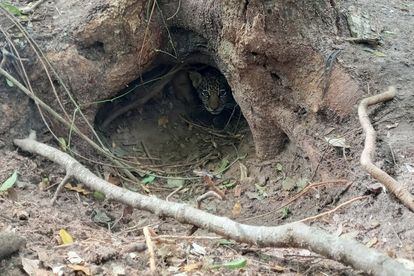For the first time in seventy years, two jaguars have been born in freedom in the Esteros del Iberá, in the Argentine province of Corrientes.
The Rewilding Argentina Foundation announced this Thursday that the puppies are the sons of Aramí, a female born in captivity and released in the national park last year, and Jatobazinho, from Brazil.
The first signs of the birth of the puppies date back to May 17.
That day, Aramí (whose name means sky in Guaraní) restricted his movements to a minimum.
The GPS collar that he wears around his neck and allows to know his location showed that he remained in a single place in this natural reserve of 1.3 million hectares.
“They also stay in the same place when they eat, but only for a day or two, so we suspected that she might have calved.
We didn't see her until a month later, with the puppies in her mouth, thanks to a camera trap," Sebastián di Martino, director of conservation at the foundation, says by phone.
Days ago, a pair of researchers saw the newborns for the first time.
They were hiding in the hollow of a tree.
A baby of the Arami jaguar takes shelter under a tree, in the Iberá National Park (Argentina). CONICET Yaguarete Project
“Like cats, jaguars are born with their eyes closed, defenseless.
During the first few weeks, the mother hardly ever goes hunting, she only takes care of them and gives them her breast.
In two months they can start following her mother and they will stay with her until a year or so, when a gradual separation begins, ”continues Di Martino.
With the two cubs, the current population of wild jaguars in the Esteros del Iberá is ten specimens: four adults, four juveniles and the two that have just been born.
The four juveniles were born inside the pens of the Yaguareté Reintroduction Center (CRY) in Iberá and were later released together with their mothers.
In Argentina, where this critically endangered feline has been declared a national monument, the total number does not exceed 250.
The reintroduction project in the Iberá Wetlands began a decade ago and aims to contribute to the restoration of this valuable ecosystem, one of the largest wetlands in Argentina.
“The jaguar is the top predator and is what ecologists call a key species due to its prominent role.
When these species are missing, the ecosystems begin to degrade and can collapse, becoming something else”, describes the conservation director of Rewilding.
The presence of jaguars regulates the populations of herbivores that are their prey and improves the quality of the vegetation, increasing carbon sequestration.
By hunting the weakest individuals, they eliminate pathogens from the environment, Di Martino points out among the benefits provided by the reintroduction of this species into the ecosystem.
Livestock producers around the national park are the most reluctant to see this predator return, considering it a threat to their animals and against whom they previously did not hesitate to shoot.
However, the rapid development of nature tourism as one of the engines of the local economy means that the project is gaining more and more followers.



/cloudfront-eu-central-1.images.arcpublishing.com/prisa/5FP2BFK47VGTTKRWD3G42LNWPU.jpg)





